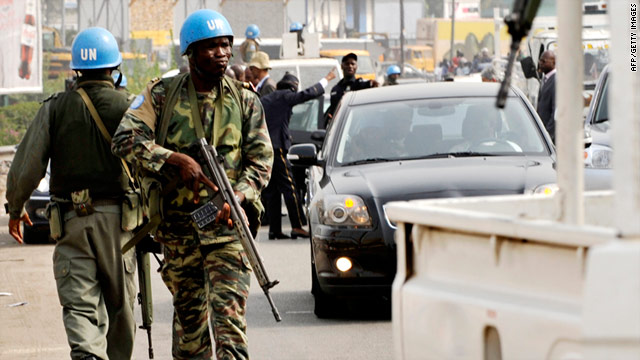Security Council OKs more troops for Ivory Coast

- NEW: The United Nations votes to send 2,000 more troops was unanimous
- Envoy: The self-declared president reneged on a promise to lift a blockade of his rival
- Observers say Alassane Ouattara won the presidential election in November
- Incumbent Laurent Gbagbo refuses to step down
(CNN) -- The U.N. Security Council voted unanimously Wednesday to send 2,000 additional troops to Ivory Coast, bringing the total mission there to more than 11,000 troops and police.
The vote originally had been scheduled for Tuesday, but Security Council diplomats said it was delayed because Russia had objections to the "political" language in the draft resolution.
U.N. officials requested up to 2,000 more peacekeepers in early January.
The political standoff in the country has raised fears of a renewal of the bloodshed suffered after a civil war broke out in 2002.
More than 25,000 Ivorians have fled to neighboring Liberia since the current crisis began, the U.N. High Commissioner for Refugees reported last week.
Meanwhile, the African Union on Wednesday blamed Ivory Coast's self-declared president, Laurent Gbagbo, for the failure of talks so far to resolve the crisis in the cocoa-producing West African nation.
 Laurent Gbagbo pressured to step down
Laurent Gbagbo pressured to step down
 Strategy to remove Ivory Coast's Gbagbo
Strategy to remove Ivory Coast's Gbagbo
"There had been progress in the talks, but Gbagbo went back on his earlier agreement to remove the blockade leading to and from the Golf Hotel where (President-elect) Alassane Ouattara is staying," said a spokesman for Kenyan Prime Minister Raila Odinga, the AU mediator.
"Gbagbo has to step down to make way for Ouattara, who legitimately won the election," said Odinga's representative, Salim Lone, speaking for the African Union and the Economic Community of West African States.
"The request to remove the blockade was because the AU argued that it's difficult to have discussions with a prisoner," Lone said.
Ouattara is holed up in the hotel in Abidjan under the protection of U.N. peacekeepers. The United Nations has blamed Gbagbo's supporters for a string of attacks on U.N. vehicles and troops in the past week.
An independent electoral commission declared Ouattara the winner of the country's presidential election in November, but Gbagbo, the incumbent, has refused to step aside.
Odinga is now leaving Ivory Coast for Ghana, Burkina Faso and Mali. He'll meet the heads of state of each country to discuss the Ivory Coast crisis, Lone said, denying that Odinga had "given up on ... finding a solution to the crisis.
"He's still committed to the African Union and ECOWAS will to first and foremost find a peaceable solution to the crisis. Use of force will be a last resort," Lone said.
The Economic Community of West African States has threatened to use "legitimate force" to remove Gbagbo, who met Monday with African Union mediator Odinga.
Gbagbo's foreign minister, Alcide Djedje, said earlier this month that the peacekeepers are "complicit with the rebellion" and that the sitting government has "no more confidence in the U.N."
The West African nation was wracked by civil war from 2002 to 2007, when a settlement left the country divided between north and south. The 2010 elections came with high expectations that they would open a new chapter in the country's history.
CNN's Lillian Leposo contributed to this report.
